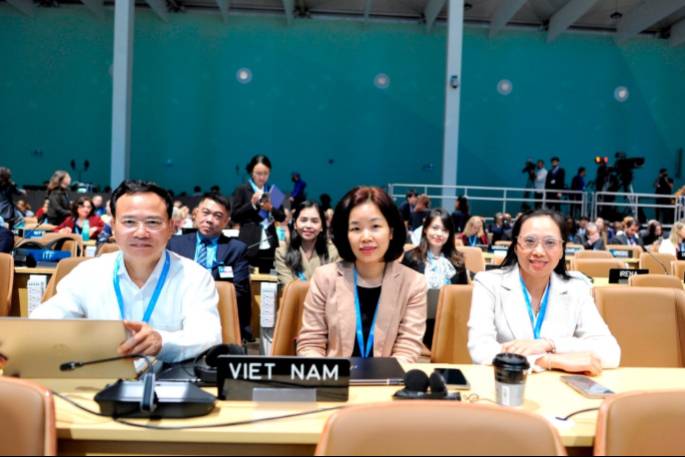The 29th sessions of the Conference of the Parties to the United Nations Framework Convention on Climate Change (COP29) officially opened on November 11, 2024, in Baku, Azerbaijan.
As of the opening day, nearly 67,000 participants have registered to attend the negotiations, which will take place from November 11 to 22. The conference aims to encourage governments to take stronger actions in reducing greenhouse gas emissions and increasing climate finance in the coming years.
* United for a Green World
Viet Nam's delegation at COP29 includes representatives from the Ministries of Natural Resources and Environment, Industry and Trade, Transport, Agriculture and Rural Development, Planning and Investment, Finance, Science and Technology, and Foreign Affairs. Also attending are members of Vietnam's climate negotiation task force and representatives from various agencies, localities, banks, and businesses implementing Viet Nam's COP26 commitments.
Mr. Phạm Văn Tấn, Deputy Director General of the Department of Climate Change (Ministry of Natural Resources and Environment) and Deputy Head of Viet Nam's Climate Negotiation Task Force, highlighted COP29's slogans, "United for a Green World" and "Raise Ambition, Activate Action."
The first slogan calls for solidarity, urging countries to honor their commitments to greenhouse gas reductions and financial contributions to climate initiatives, working together for a common goal. The second slogan arises from the findings of the first global stocktake, showing that even if all current emission reduction commitments are met, global temperatures are still projected to rise by 2.4–2.7°C—far above the Paris Agreement targets of limiting warming to 2°C and striving for 1.5°C. Thus, nations must "raise ambition" to align with the Paris targets and "activate action" to turn commitments into reality.
At COP29, Viet Nam advocates for developed countries to ensure climate finance targets and maintain transparency in income sources and expenditures through annual reports. Viet Nam also calls for balanced spending on adaptation and mitigation efforts, as current discrepancies are significant.
 Vietnamese delegation attends the opening session of COP29
Vietnamese delegation attends the opening session of COP29* Reflecting on 10 years of the Paris Agreement implementation
In the opening session of COP29, President Mukhtar Babayev they emphasized that COP29 marks a decade since the implementation of the Paris Agreement. The upcoming round of Nationally Determined Contributions (NDCs) represents the world's last chance to limit global warming to 1.5°C and build resilience to climate impacts. President Babayev urged all countries to enhance their emission reduction targets in the new NDCs.
Meanwhile, UNFCCC Secretary-General Simon Stiell called on nations to establish a more robust climate finance target. He noted that an ambitious climate finance agreement would benefit all countries. A key focus at COP29 is finalizing Article 6 of the Paris Agreement, aiming to establish an international carbon market and accelerate global emissions reduction efforts.
This year's conference occurs amid unprecedented heatwaves, floods, and severe storms that have caused significant damage worldwide. Global temperatures have broken records in many regions, with atmospheric CO₂ concentrations reaching a historic high of 426.91 ppm in June 2024. Global greenhouse gas emissions rose by 1.3% in 2023 compared to 2022, outpacing the previous annual increase rate of 0.8% from 2019–2020, a record high with no signs of slowing.
In addition to activities mandated by the Convention, the Kyoto Protocol, and the Paris Agreement, the host country has introduced several side-event themes. These provide opportunities for governments, international organizations, the business community, and affected groups to showcase achievements and efforts in combating climate change and foster collaboration with stakeholders. Key themes include: Finance, Investment, and Trade; Energy, Peace, Relief, and Recovery; Science, Technology, Innovation, and Digital Transformation; Human Capital, Children, Youth, Health, and Education; Food, Agriculture, and Water; Urban Development, Transportation, and Tourism; and Nature and Biodiversity.